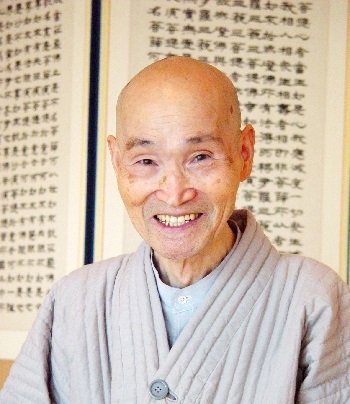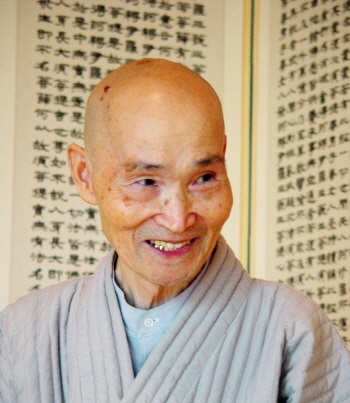ZEN MESTEREK ZEN MASTERS
« Zen főoldal
« vissza a Terebess Online nyitólapjára


무주청화 / 無住淸華 Muju Cheonghwa (1923-2003)
(Magyar átírás:) Mudzsu Cshonghva
Cheonghwa (1923 ~ 2003)
http://www.koreanbuddhism.net/master/priest_view.asp?cat_seq=10&priest_seq=27&page=3
The Great Spiritual Master Cheonghwa was born at Mu-an in Cholla Province in 1923. After graduating from Gwangju Educational College, he went to Japan to study more. Returning home, he founded a public school and taught students at his hometown. However, he renounced the job upon seeing many conflicts between left wing and right wing ideology of that time, and left home to seek truth. He became a monk under the direction of Master Geumta at Unmun Hermitage at Baekyang sa Temple at the age of 24.
He moved through many meditation halls and hermitages over the whole country to practice, keeping silence, never lying down, and taking one meal a day. He started to instruct sentient beings when he was over 60 years old, after such a long time of practice, around 1985. With the intention of dissemination of Korean Buddhism in other countries, in 1992 he opened the Diamond Meditation Center in California, and served as a member of the Council of Elders for the Jogye Order until entering nirvana. He always focused his mind on keeping precepts and a simple life. He taught that samadhi (concentration) comes from keeping precepts, and wisdom follows samadhi.
His contribution to modern Korean Buddhism was to suggest "Seon with recollecting Buddha's name" in an atmosphere tending toward hwadu meditation. He claimed "the Buddha's name, for example Amitabha Buddha or Avalokitesvara Bodhisattva, is a hwadu itself that the Buddha shows us. This new way of practice is in harmony with personal spiritual capacity, without opposing hwadu meditation. It makes you find that you and Buddha are not two, to recollect Buddha's name repeatedly while praying for what you wish."
He passed away on November 12, 2003. He was 80 years old, 57 years of Dharma age.
His last day was the same as other days. Though he was not in good shape for the last couple of months, he had kept on taking one meal a day and never lying down as practice. He took only a simple lunch and had dharma talks with his disciples. Around late afternoon, he took a walk in the courtyard in front of the Main Hall, saying that it was time for him to leave, looking long at Ji-ri Mountain far away. He finally lied down to take a long rest after more than 40 years, and asked the disciples to "practice hard in order to help sentient beings. That is the way to pay back Buddha's blessing."
His last Gatha is:
I do not care about coming or going
Either to this samsara or to nirvana
Receiving Buddha's blessings as countless as the whole universe
I deplore that my return for this is a tiny stream.
Though he went away leaving his old body, his fragrance is still with us.
In Memory of Master Cheonghwa
December, 2003
Written by Lewis R. Lancaster
(Professor Emeritus, University of California Berkeley)
Ven, Cheonghwa was born in the midst of colonialism, when Japan was becoming the dominant force in East Asia. He, like so many of his countrymen, sought for an identity within the political maelstrom of World War II and its aftermath. Education was the one of the avenues that he explored, both in Kwangju and Japan. Finally he rejected that life and turned to Buddhism. As a monk, he was renowned for his practice for meditation and his striving to attain the highest insight. For some years, this meditative experience brought about silence and like the Buddha after the night of enlightenment, Ven. Cheonghwa remained deep in what he would later call the Diamond Seon. However, like the founder of Buddhism, he took the most difficulty to paths, that of sharing his wisdom with the people of this world who had not penetrated to the levels of his own achievements.
Whit a fervor that matched his meditation, he moved into the full expression of teaching.
In the last decade of the 20th century, he came to Sambo-sa in Carmel Valley and helped to rebuild that pioneering center of Korean Buddhism in America. Some of his last years were spent in a return to his solitary state of meditation. It is perhaps true that he was sadden by the slowness of the spread of the Buddhist teaching in America. I wonder if he finally came to see that just his presence amongst us was his contribution to that spread, whether it was yet recognized or not. As buddhism revives among Koreans, especially in the homeland, we can sense his spirit as one of those who lived through difficulties without faltering. It is our honor today to remember him. When I lost a beloved member of my family, a friend said that when someone you love and admire dies, they leave behind a gift. It is the task of the living to discover that gift. It is our challenge to find the gifts of Ven Cheonghwa and to use them as a memorial to him.